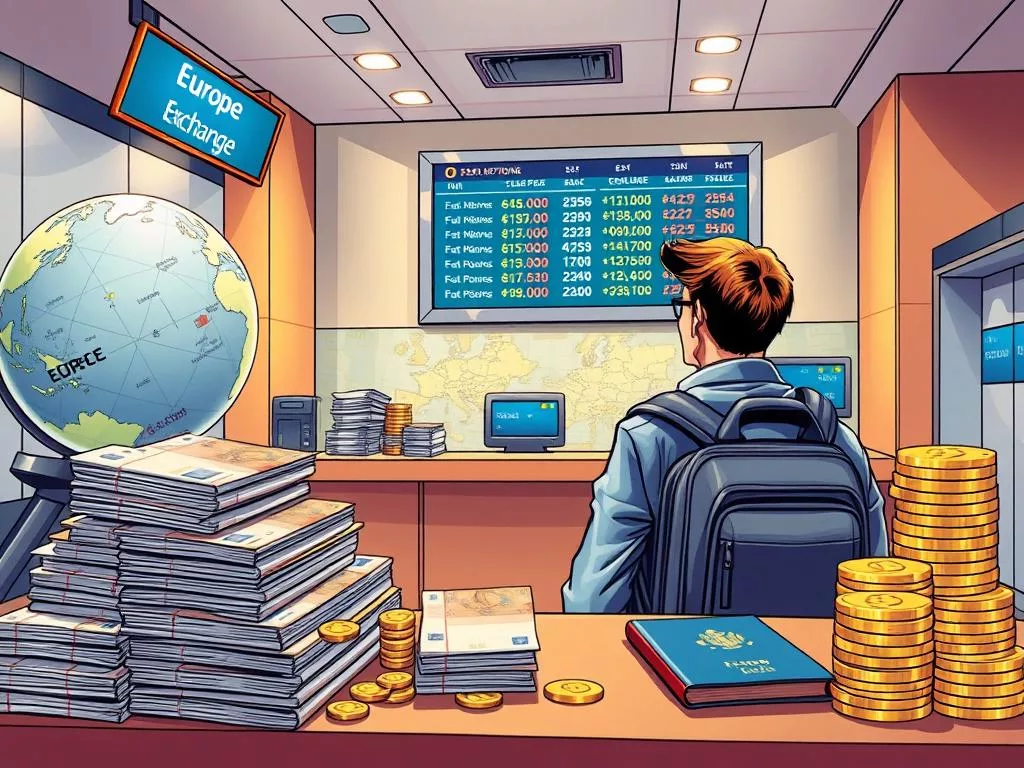Traveling to Europe means you need to plan your money matters. The Euro (€) is used in 19 European countries, like France, Germany, and Spain. Knowing how to exchange money in the USA can save you a lot of time and money.
For the best euro rates, start with banks and credit unions. They often have good rates and lower fees. Even places like Bank of America let you order euros online for delivery or pickup. An economical guide can help you find the most cost-effective ways to buy euros.
Also, keep an eye on exchange rates and plan ahead to avoid extra costs. Skip airport kiosks and unofficial exchanges because they charge more. Being informed helps make exchanging money easy and affordable.
Where to Exchange Currency Before Traveling
When you’re getting ready to travel, finding the best currency exchange rates is key. Choosing the right place to exchange your money can save you a lot. Banks and credit unions in the USA usually offer the best rates and lower fees than other places.
For example, Bank of America and Citibank have good exchange services. They charge a small fee for transactions under $1,000. Their shipping fees are around $7.50 for online orders under $1,000.

Checking rates in real-time, like through Reuters, can help you get the best deals. This way, you avoid spending too much money when you travel. You can order foreign currencies, like Euros, online or by visiting a branch.
It’s important to know that airport exchange rates can be up to 14% higher than the current International Monetary Fund (IMF) rate. This makes banks and credit unions a better choice.
Here’s a quick look at what banks and credit unions charge for exchanging foreign currency:
| Institution | Service Fee | Additional Fees |
|---|---|---|
| Bank of America | $5 (under $1,000) | $7.50 shipping fee |
| Citibank | $5 (under $1,000) | $10 to $20 delivery fee (waived for Citigold) |
| US Bank | $10 (under $250) | No fees for larger transactions |
| TD Bank | $7.50 (under $1,500) | None |
| America First Credit Union | $10 to $20 | Transaction limit of $5,000 |
| Wings Financial Credit Union | $10 (under $300) | Waived for larger orders |
Online services like Wise also offer great deals. They provide over 40 currencies at low fees starting at 0.41%. These services often match or beat the rates of local banks or airport exchanges.
For emergency exchanges abroad, use network ATMs of your financial institution. This way, you avoid high fees. Foreign transaction fees abroad range from 1% to 3%, and non-network ATM fees are usually about $5 per transaction.
For more tips on exchanging currency efficiently, check out this detailed guide on how to exchange currency efficiently before you travel.
Guide to Best Way to Buy Euros in USA
When you want to buy euros in the USA, there are good ways to do it. Banks like U.S. Bank are safe and easy. You can order Euros online or through apps and pick them up at a branch.
It’s key to compare exchange rates and know the fees and rates banks charge. Wise offers good rates with the Wise Card.

Avoid exchanging money at airports or hotels because they charge too much. Banks and credit unions give better rates and lower fees. They are the best way to buy euros.
To make smart money choices, always look around and compare. Some banks offer high APY rates, like Barclays at 4.35% or BMO Alto at 4.30%. Knowing this can save you money, avoiding extra costs.
Banks like Wells Fargo and Discover have different fees for travel money. Make sure to check these fees before you buy. Services like CXI might match prices, saving you money.
Fintech options, like the Wise Travel Card, offer great deals. They have low fees on ATM withdrawals and good exchange rates. This card has over 244,562 reviews, showing it’s trusted and popular.
Using ATMs and Avoiding Fees Abroad
Using ATMs in Europe is a good way to get local currency. But, it’s important to watch out for fees. Most global withdrawals, like those from Bank of America®, cost $5 plus an extra 3%.
Using ATMs from big networks like Visa® or MasterCard® can help avoid high fees. This is because these networks often have lower fees.
Some US banks, like HSBC and USAA, don’t charge fees for using partner ATMs abroad. It’s smart to take out more money at once to save on fees and exchange rates.
Looking at costs can show how much you can save:
| Bank | ATM Fee | Foreign Transaction Fee | Refund Policy |
|---|---|---|---|
| Bank of America® | $5 | 3% | No |
| HSBC | $0 | 1-3% | No |
| USAA | $0* | 1% | Up to $10 |
| Wells Fargo | $5 | 3% | One per month (Prime); Unlimited (Premier) |
* USAA reimburses up to $10 in ATM surcharges.
Choosing to withdraw more money at once can save you money. Using ATMs in Europe and paying in local currency can also save you money. This is because dynamic currency conversion often has hidden fees.
For tips on international withdrawals, use a debit card for purchases and cash only when needed. This way, you get the best exchange rates and avoid fees. Always be careful of foreign transaction fees, which can be 1-3% of the transaction amount.
Understanding your bank’s policies on foreign transactions can help you save money. For example, buying things directly with your card or using cash-back options can reduce the need for ATM withdrawals. This can save you money on fees when traveling abroad.
Alternative Methods: Online Currency Converters
Online currency converters are a great option if you don’t want to use bank services. Sites like Currency Exchange International let you order currency online and get it delivered. This is convenient, but you might pay more than banks and face delivery fees.
Travelers often find multicurrency accounts from fintechs like Wise and Revolut useful. These accounts make buying and spending in different currencies easy and cheap. Wise is notable for converting over 40 currencies at the mid-market rate and has low fees starting at 0.41%.
It’s important to know about exchange rates and fees when using online services. For example, Bank of America charges $7.50 for delivery under $1,000 and $20 for overnight. UK travelers might prefer using ATMs abroad, looking for ones without fees. Knowing about exchange rate changes and avoiding mistakes can help you manage your money better.

